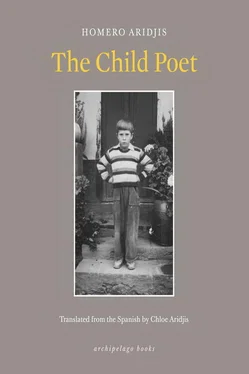Whenever my father went to Mexico City on business he deposited me at my uncle’s house. As I sat reading Góngora they observed me from the end of the living room like cats with lackluster eyes perched on the sofa. Absorbed in my reading, I’d forget about them at times, only to find them watching from between a display case and a painting of The Death of Manolete whenever I raised my eyes. And when I walked past them to the bathroom or kitchen their eyes followed me.
The sight of them made me want to open the windows to dispel the mood they provoked in me, but when they were in the living room I couldn’t open them on account of the drafts, drafts they immediately felt even from another room or the bathroom.
Then, when they saw I was nervous, in compensation for the unopened windows they offered me a candy they’d slowly select from a little box labeled Lágrimas Poblanas, which I’d never tried and which tasted as if it had been stored for fifty years.
Only one afternoon did I see them lose their composure, seized by an ire so complete it made them stumble, spit, tremble, and shed the powder on their cheeks all at once. This was when my uncle addressed them as “madams” rather than “mademoiselles.” An omission of syllables that transformed them from virgins into whores, an assault on the chaste motive for their solitude.
Despite the fact my aunt enjoyed a much better financial situation than her guests, she followed a hunger diet in a state of euphoria. She was so used to it that had anyone told her she ate poorly she would have been surprised, insisting that, on the contrary, she ate in the most refined way possible in Mexico, basing her cuisine on forgotten recipes that had been preserved thanks to the pedigree of her parents.
Nevertheless, she appeared to be hungry all the time, and would tear off bits from a roll or nibble on an apple, making them last all day.
A way of eating without eating, which gave others the impression that she had the appetite of a bird. And one didn’t know which was the greater punishment: my uncle’s neglect or the tyranny of her own diet. At the store she was the little old lady of 50 grams of sugar, 25 grams of coffee, 50 grams of noodles, and a quarter liter of milk; at the butchers’ she was the scraps-for-the-cat-and-bones-to-boil-for-broth lady. Yet her hungry condition stood in contrast with her happy face and pride at being married to my uncle.
For his part, he tended to eat in those restaurants where you don’t know which is worse, ordering a particular dish or having to eat it since you ordered it and will have to pay. The diner wonders whether it might not be better for his health to lose the money spent on the dish rather than add to the loss the unpalatability of the meal and the chance of getting sick. He’s seated at a shared table, next to one of those elderly couples where the wife talks about food while she eats and the husband eats in silence without listening, a habit that apparently followed them out of the house and into the street.
Ruedas was the painter who helped my uncle. Or rather, he carried out the commissions my uncle received. His arrival was announced by a loud ringing of the bell at around eleven every morning.
My uncle ran out immediately, with canvases under his arms, clutching brushes and tubes of paint to leave in the studio for Ruedas.
Once he had explained the job, my uncle locked him up in the room so Ruedas wouldn’t disappear with the canvases, paint, or brushes, for he was a heavy drinker, and when he had money at his disposal or something to sell he would slip away to get drunk, leaving behind the feet of the Juan Diegos or the Virgins of Guadalupe, for he had learned to paint from the bottom up, as if saying a prayer on his knees.
Ruedas had a red nose and swollen eyelids, and the paintbrushes trembled in his hands; sleep-deprived, or still tipsy, he occasionally took blue for pink or painted a virgin’s face green.
At two o’clock sharp, he started pounding on the studio door with his fists, although my uncle often went out and he had to stay until five to be released. Forced to wait, he intermittently kicked, punched, and butted the door, without managing to open it.
His enraged banging terrified my aunt, who from time to time went to the door to calm him down, as my uncle had phoned to say he was on his way, but all she got were insults, which she feared would translate into blows to her husband.
Finally, my uncle went to open the door, money in one hand and the other brandishing a stick, as if he were letting a wild animal out of its cage. From her half-open door, my aunt monitored the situation ready to hurry over to defend her husband should Ruedas attack him with a palette knife.
DURING THE DAYS leading up to the Feast of San José — the saint who, according to my mother, had saved me when I’d been on the verge of dying from the gunshots — the ladies in charge of his worship at church would come to the house.
And so one morning in March three elderly campesinas, in clothes so ragged they resembled patchwork, knocked on the door. Grizzled, lame, and pockmarked, they smiled at me toothlessly when I opened the door, and my impulse was to shut it.
The skinniest one had a hanging lip; the prettiest was cross-eyed; the least old had large hands like baseball mitts. Trying to be likeable, all three produced forced smiles so grim I wished they’d remained solemn.
The squint-eyed one asked me if my mother was home, in a voice so soft it seemed to come from some other person or be thrown by a ventriloquist. When I answered yes, she said they wanted to see her, so I went to the garden and called my mother. She took fright at the sight of them, asking right away what they wanted. To which the skinny one replied, as if a young woman were speaking with her tongue and blushing in her ears, that they wanted to sing at the Feast of San José, a proposal that made my mother think that if their voices were as off key as their bodies were bent over and their faces grotesque, they would scare everyone off. Nonetheless, she asked them to sing her a devout song. And they did so with such enthusiasm that the stiffness of their features began, as they sang, to relax, the roughness of their faces to soften, and their eyes to shine so brightly that they seemed to become young again before us. As if the joy that burst from their mouths lightened their bodies and poured out their souls with their voices.
Amid the flowerpots and the plants, the three women, sunlit in the corridor and singing in unison, personified ugliness transformed into song. As if by optical illusion, or a reversal of reality occasioned by solar flares, they were now the Furies, now the Graces.
That March afternoon, my mother, her hands floured, was about to put some cookies into the oven when my father came into the kitchen and asked me to take a walk with him. It was a Wednesday, meaning the store was closed. A cage hung on the wall; inside shivered a goldfinch with wet wings. Beside the cage dangled a string bag of eggs. The sun coming through the window was like a brilliant yolk and its rays whitened the table legs and the brick floor.
Before we headed out, my mother slipped a piece of Ojo de Agua cheese into my mouth with a hand smelling of vanilla.
But as I watched her hand withdraw to pour milk into a copper pot, I noticed wrinkles on the back. I quickly sought my father’s hands for comparison, and studying them, I perceived the passage of time … And perhaps to drive away that image of their old age and death, I shook the goldfinch’s cage. The bird, its wings stiff, clung to a wire and did not move.
Outside the kitchen, swallows that had built nests on top of the hanging lamps in the corridor swooped overhead. Their wheeling seemed to celebrate the sun-filled instant; perched on the roof tiles they throbbed on their little feet, like tremulous hearts about to leap into the air.
Читать дальше












